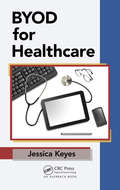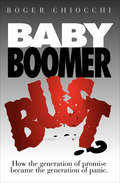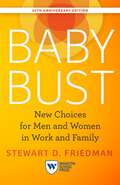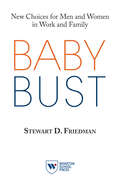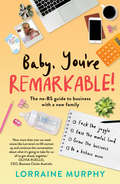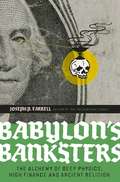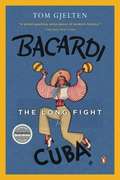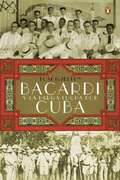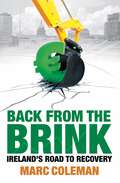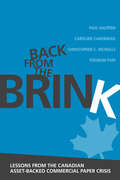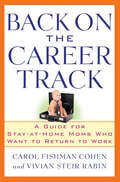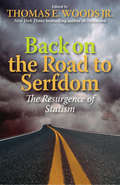- Table View
- List View
BYJU'S: EdTech Giant Investing in Brick and Mortar
by Rachna Tahilyani John J-H KimThe founder and CEO of BYJU'S, India's largest edtech firm and one of the world's most valuable edtech companies, is considering acquiring Aakash Educational Services (Aakash), one of India's largest brick-and-mortar test-prep firms, for $1 billion. Is this a good strategic investment for BYJU'S, a rapidly growing "tech-first" company that still had so much to achieve online?
BYOD for Healthcare
by Jessica KeyesWith 70 percent of organizations already adopting bring your own device (BYOD) and Gartner expecting this number to increase to 90 percent by the end of 2014, it is not a question of if, or when, it's a question of will you be ready.BYOD for Healthcare provides authoritative guidance to help you thrive during the healthcare BYOD (hBYOD) revolution.
BabbaCo
by Jeffrey J. Bussgang Gaurav JainHaving just raised a Series B financing, the case protagonist is faced with a tough decision: should she "step on the gas" and scale the customer base, or continue focusing on fine-tuning the product and business model. The case describes the various marketing channels employed by the BabbaCo team (Search, Email, Social Media, Deal Sites, Affiliates, etc.), including the strategy and effectiveness for each. Readers can use this knowledge to evaluate the effectiveness of the marketing efforts to date and determine whether they think the company is ready to scale those efforts or whether it is premature to do so.
Babban Gona: Great Farm
by Caroline Elkins Tarun Khanna Kristin E. Fabbe Eleni Kyrkopoulou Zeke GillmanCase
Babcock International Plc.
by John R. Wells Galen DanskinIn 2013, Babcock International Plc (Babcock) was the largest engineering services provider in the UK with sales of over 3 billion. Under the leadership of CEO Peter Rogers, Babcock had grown revenues and profits nearly tenfold over the previous decade as it benefited from increased public sector outsourcing. In 2012, for the UK's Ministry of Defense (MOD), Babcock trained over 50,000 troops, maintained the nuclear submarine fleet, provided engineering support for military vehicles, and managed numerous facilities at military bases. On the civil side, the company decommissioned aging nuclear plants, maintained the Metropolitan Police auto fleet and other emergency services fleets, and was the UK's leading trainer of engineering apprentices. Babcock's leadership team believed that continued pressure on public spending would provide opportunities for double digit growth in the UK for at least five years. However, this might not come from Babcock's primary customer, the Ministry of Defense. What other national and local government agencies might the firm target? On the civil side, the resurgence of the salience of nuclear power generation in the mid 2000s had appeared to be good news for Babcock with its long-standing nuclear expertise, but the April 2011 Fukushima nuclear leak in Japan had shed doubt on future construction, while the fracking of shale deposits to extract natural gas promised a much lower cost supply of abundant energy. Nevertheless, decommissioning nuclear power stations promised steady and growing work. What other opportunities might Babcock pursue in the UK? Meanwhile, analysts were pushing for more international expansion but efforts at building business in South Africa, Canada, and Australia had been slow, with only 16% of revenues coming from outside the UK in 2013, a figure little changed since 2005. What would drive Babcock's long term future growth?
Baby Boomer Bust?: How the Generation of Promise Became the Generation of Panic
by Roger Chiocchi&“A lucid and vivid account of the combined flawed social policies and ingrained corporate attitudes that have brought the US economy to its knees.&” —Dr. Ronald Manheimer, former executive director, North Carolina Center for Creative Retirement Baby Boomer Bust? examines and analyzes the meltdown of 2008/2009 from economic, political, and social perspectives and illuminates how the meltdown has directly impacted Baby Boomers—once known as the generation of promise, but now the generation of panic. It examines the downturn&’s impact on Boomers&’ lifestyles, dreams, aspirations, and future plans. Baby Boomer Bust? raises some provocative questions regarding the generations ability to survive the worst economic downturn since the Great Depression &“A revealing insight into the effects of the recent economic downturn on the very generation that helped to create one of the world&’s most powerful and influential economies. Mr. Chiocchi&’s examination brings into sharp relief some of the more salient, and subtle, social-consequences of one of the greatest economic disasters in the history of Western civilization.&” —Michael J. Formica, MS, MA, EdM, psychotherapist, social scientist &“A sobering view of the underside of the economic meltdown.&” —Jerry Shereshewsky, CEO, Grandparents.com
Baby Bust, 10th Anniversary Edition: New Choices for Men and Women in Work and Family
by Stewart D. FriedmanTen years ago a groundbreaking cross-generational study revealed that greater freedom and new constraints were leading fewer young people to choose parenthood. In the intervening years, the decision to have a family has not gotten easier.Stew Friedman, founding director of The Wharton School's Work/Life Integration Project, studied two generations of Wharton college students as they graduated: Gen Xers in 1992 and Millennials in 2012. The cross-generational study produced a stark discovery—the rate of graduates who planned to have children had dropped by nearly half over those 20 years. While some might wonder what this privileged group can tell us about broader trends in the United States, Friedman argues that they were “the canaries in the coal mine. . . . if they could not see a way to make their careers and families work, how could those with fewer opportunities and resources square this circle?”In a new preface to this 10th anniversary edition of Baby Bust, Friedman observes that the birth rate in the United States has continued to decline in the years since. He offers new insights into why fewer people are choosing to have children, how the pandemic affected these trends, and what can be done about it.In this book, Friedman addresses:+ How views about work and family have changed;+ Why men and women have different reasons for opting out of parenthood;+ How family has been redefined;+ What choices we face in our social and educational policy; and+ How organizations and individuals—especially men—can spur cultural change.In the debates on work and family, people of all generations are calling for a reasoned, thoughtful, research-driven contribution to the discussion. In Baby Bust, Friedman offers just that: an astute assessment of how far we have come and where we go from here.
Baby Bust: New Choices for Men and Women in Work and Family
by Stewart D. FriedmanLean in. Opt out. Have it all. None of the above.A new book based on a groundbreaking cross-generational study reveals both greater freedom and new constraints for men and women in their work and family lives.Stew Friedman, founding director of The Wharton School's Work/Life Integration Project, studied two generations of Wharton college students as they graduated: Gen Xers in 1992 and Millennials in 2012. The cross-generational study produced a stark discovery - the rate of graduates who plan to have children has dropped by nearly half over the past 20 years. At the same time, men and women are now more aligned in their attitudes about dual-career relationships, and they are opting out of parenthood in equal proportions. But their reasons for doing so are quite different.In his new book, Baby Bust: New Choices for Men and Women in Work and Family, Friedman draws on this unique research to explain why so many young people are not planning to become parents. He reveals good news, that there is a greater freedom of choice now, and bad, that new constraints are limiting people's options. In light of these present realities, he offers ideas for what we can do as a society, in our organizations, and for ourselves to make it easier for men and women to choose the lives they want. In this book, Friedman addresses:+ How views about work and family have changed in the past 20 years+ Why men and women have different reasons for opting out of parenthood+ How family has been redefined+ Why we are all now part of a revolution in work and family+ What choices we face in our social and educational policy+ How organizations and individuals - especially men - can spur cultural changeIn the debates on work and family, people of all generations are calling for a reasoned, thoughtful, research-driven contribution to the discussion. In Baby Bust, Friedman offers just that: an astute assessment of how far we have come and where we need to go from here.
Baby or Bust: Financial Planning for New Parents and Parents-to-be
by Nicola FieldYour bundle of joy comes with a bundle of financial considerations -- everything from managing the mortgage on one income to paying for your child's education. So from the moment you decide to start a family it's worth taking the important step of getting financially fit for parenthood. Mother-of-four and personal finance journalist Nicola Field takes parents and parents-to-be on a step-by-step journey that covers every aspect of funding a family. Baby or Bust tackles the key issues faced by parents today, including: deciding when to have children managing the extra costs living well on one income taking parental leave working out which government benefits you are entitled to saving for your child's education. With lots of easy-to-follow tips and plenty of good, sound money advice, this entertaining and informative book is a must-read for anyone about to start a family. You may not be able to stop the baby from waking at 3 am but at least you won't be lying awake worrying about the family finances!
Baby, You're Remarkable: The no-BS guide to business with a new family
by Lorraine MurphyAs one of Australia's leading entrepreneurs, Lorraine Murphy has always been a motivated businesswoman - goal oriented, dynamic and, above all, organised. Now with Baby, You're Remarkable! she's here to prove you can be just as career driven when you're a new parent. This is not a one-size-fits-all step-by-step guide - after all, every business, every child, every parent and every family is different. Instead, this book is a refreshingly unfiltered, totally honest and judgement-free account of Lorraine's personal (and not always perfect!) journey in running a business and having a baby. Including experiences and insights from a variety of other parents, and coupled with plenty of useful checklists, reading lists and suggested downloads, Lorraine's story will show you it is possible to have it all, and will inspire you to maintain your REMARKABLE career while growing a REMARKABLE family.
Babylon's Banksters
by Joseph P. FarrellIn this latest installment of his remarkable series of books of alternative science and history, Joseph P. Farrell outlines the consistent pattern and strategy of bankers in ancient and modern times, and their desire to suppress the public development of alternative physics and energy technologies, usurp the money creating and issuing power of the state, and substitute a facsimile of money-as-debt. Here, Farrell peels back the layers of deception to reveal the possible deep physics that the "banksters" have used to aid them in their financial policies.Feral House also published Farrell's Philosopher's Stone: Alchemy and the Secret Research for Exotic Matter.
Bacardi and the Long Fight for Cuba: The Biography of a Cause
by Tom GjeltenIn this widely hailed book, NPR correspondent Tom Gjelten fuses the story of the Bacardi family and their famous rum business with Cuba's tumultuous experience over the last 150 years to produce a deeply entertaining historical narrative. The company Facundo Bacardi launched in Cuba in 1862 brought worldwide fame to the island, and in the decades that followed his Bacardi descendants participated in every aspect of Cuban life. With his intimate account of their struggles and adventures across five generations, Gjelten brings to life the larger story of Cuba's fight for freedom, its tortured relationship with America, the rise of Fidel Castro, and the violent division of the Cuban nation.
Bacardi and the Long Fight for Cuba: The Biography of a Cause
by Tom GjeltenIn this widely hailed book, NPR correspondent Tom Gjelten fuses the story of the Bacardi family and their famous rum business with Cuba's tumultuous experience over the last 150 years to produce a deeply entertaining historical narrative. The company Facundo Bacardi launched in Cuba in 1862 brought worldwide fame to the island, and in the decades that followed his Bacardi descendants participated in every aspect of Cuban life. With his intimate account of their struggles and adventures across five generations, Gjelten brings to life the larger story of Cuba's fight for freedom, its tortured relationship with America, the rise of Fidel Castro, and the violent division of the Cuban nation.
Bacardi and the Long Fight for Cuba: The Biography of a Cause
by Tom GjeltenIn this widely hailed book, NPR correspondent Tom Gjelten fuses the story of the Bacardi family and their famous rum business with Cuba's tumultuous experience over the last 150 years to produce a deeply entertaining historical narrative. The company Facundo Bacardi launched in Cuba in 1862 brought worldwide fame to the island, and in the decades that followed his Bacardi descendants participated in every aspect of Cuban life. With his intimate account of their struggles and adventures across five generations, Gjelten brings to life the larger story of Cuba's fight for freedom, its tortured relationship with America, the rise of Fidel Castro, and the violent division of the Cuban nation.
Bacardí y la larga lucha por Cuba
by Tom GjeltenEn 1862, Facundo Bacardí apostó por crear en Cuba una pequeña destilería de ron, una bebida que hasta entonces solo consumían marineros y obreros. Pronto el ron Bacardí se convertiría en la bebida favorita de la isla y quedaría ligado a la identidad cubana. Recorriendo la historia de la familia Bacardí, que siempre ha estado en primer plano en todos los grandes acontecimientos de la historia de Cuba ––desde la Independencia hasta el actual embargo pasando por la Revolución y Bahía de Cochinos–– Tom Gjelten ha escrito una épica narrativa que explica la Cuba moderna, sus tormentosas relaciones con Estados Unidos, la ascensión de Fidel Castro —de la que se ofrece una perspective hasta ahora desconocida— y la violenta división que sufre la nación cubana desde entonces.
Bach Perspectives, Volume 2: J. S. Bach, the Breitkopfs, and Eighteenth-Century Music Trade (Bach Perspectives)
by Ernest May Andreas Glöckner Hans-Joachim Schulze Neal Zaslaw George B. Stauffer Gregory G. Butler Robert M. Cammarota Peggy Daub George R. Hill Yoshitake Kobayashi Ortrun LandmannLaunched in 1995, Bach Perspectives has become the premier English-language serial book series dedicated to cutting-edge Bach scholarship. The University of Illinois Press now offers the first four volumes in open access editions available for free to all interested readers. From 1727 to 1787, the Bach and the Breitkopf families enjoyed close professional ties forged by the growing trade between music composers and music printers. The second volume of Bach Perspectives examines the inventive and far-flung activities of the Breitkopf firm from the vantage point of its commerce with J. S. Bach and his relatives. Contributors: Gregory G. Butler, Robert M. Cammarota, Peggy Daub, Andreas Glöckner, George R. Hill, Yoshitake Kobayashi, Ortrun Landmann, Ernest May, Hans-Joachim Schulze, George B. Stauffer, and Neal Zaslaw
Bachelor- und Masterarbeiten verfassen: Abschlussarbeiten in Organisationen (essentials)
by Marcel Schütz Heinke RöbkenMarcel Schütz und Heinke Röbken zeigen die Besonderheiten einer Abschlussarbeit in einem Unternehmen, einer sozialen Einrichtung oder einer Behörde auf. Der vorliegende Leitfaden kann für diverse Studiengänge aller Hochschultypen genutzt werden und eignet sich gleichermaßen sowohl für (werdende) Absolventen grundständiger als auch dualer und weiterbildender Studiengänge.
Back From The Brink: Ireland's Road to Recovery
by Marc ColemanWe're in the midst of a global economic crisis and a domestic economic disaster.But enough of the hand-wringing. Where did this all come from, where are we now and, most importantly, what's going to happen next?In a compelling and jargon-free argument, economist Marc Coleman makes sense of this mess we're in with clear, accessible analysis of Ireland's economic situation and where it might be heading.Addressing first the global dimension - how early warnings were ignored, why American monetary policy failed the world and why an unfinished revolution in globalisation left us defenceless - Coleman makes a case for a new kind of capitalism.The unravelling threads that created the Irish financial crisis are also untangled. The death of competitiveness, the mismanagement of tax revenues, issues of demographics, bad urban planning, stupid banks and an unsuccessful regulator are all examined and, combined with dysfunctional politics, are shown to be the root causes of the predicament we now find ourselves in.But all is not lost.With a positive, can-do approach to the economic crisis, Coleman creates a fix-it manual for the future, explaining how Ireland can prosper again by adopting a smart economy, reforming social partnership and curing a warped fiscal cycle with budgetary and electoral reform.Ireland's economic nightmare will end. It is a dream not destroyed, merely delayed.
Back from the Brink: Lessons from the Canadian Asset-Backed Commercial Paper Crisis
by Paul Halpern Poonam Puri Caroline Cakebread Christopher C. NichollsAs global markets toppled during the 2008 financial crisis, the Canadian market for non-bank asset-backed commercial paper (ABCP) seemed on the verge of collapsing. Fueled by a top rating from DBRS, ABCP had found its way into the portfolios of some of Canada's most sophisticated investors as well as vulnerable retail investors who didn't know what they were holding.The failure of the $32 billion market could have tipped Canadian and foreign credit default swap markets into chaos if it weren't for the swift actions of a few powerful asset holders. Collectively, through the Montreal Accord and led by veteran Canadian lawyer Purdy Crawford, they managed to hold the Canadian ABCP market back from the brink of collapse by crafting a complex and innovative solution.Back from the Brink goes behind the scenes of the ABCP crisis to examine how a solution was reached and lessons learned that could prevent or mitigate future crises. The authors also examine the imaginative use of the Companies' Creditors Arrangement Act and describe the roles played by the banks, the major investors, rating agencies, and the financial regulators in the crisis's origins and conclusions. Back from the Brink holds important lessons for anyone interested in Canadian law, the future of complex investments, and Canada's capital markets.
Back on the Career Track: A Guide for Stay-at-Home Moms Who Want to Return to Work
by Carol Fishman Cohen Vivian Steir RabinFor full-time moms, going back to work doesn't mean returning to your old job and easing back into the life you had before staying home to take care of the kids. Instead, it means reigniting old contacts (even those who were once your junior), marketing yourself, and getting over the intimidation that plagues most women who have been out of the workforce, whether it's been two, six, or fifteen years. Carol Cohen and Vivian Rabin, who have successfully pulled it off themselves, know that it can be done--with careful planning, strategizing, and creativity. In BACK ON THE CAREER TRACK, they offer a seven-step program for going back to work. These steps are: -Relaunch or not? You decide -Learn confidence -Assess your career options -Update your professional and job search skills, and prepare for the interview -Network, market yourself, and clinch the opportunity -Channel family support -Handle the job (or find another one) Cohen and Rabin also offer advice on maintaining the balance between work and home, and navigating the inevitable sticky situations with family and friends that arise when you return to work. This is a comprehensive, inspiring guide that is sure to become the classic resource in this field.
Back on the Road to Serfdom: The Resurgence of Statism
by Thomas E Woods Jr.Leviathan is back The threat of statism has reemerged in force. The federal government has radically expanded its power--through bailouts, "stimulus" packages, a trillion-dollar health-care plan, "jobs bills," massive expansions of the money supply, and much more. But such interventionism did not suddenly materialize with the recent economic collapse. The dangerous trends of government growth, debt increases, encroachments on individual liberty, and attacks on the free market began years earlier and continued no matter which political party was in power. This shift toward statism "will not end happily," declares bestselling author Thomas E. Woods. In Back on the Road to Serfdom, Woods brings together ten top scholars to examine why the size and scope of government has exploded, and to reveal the devastating consequences of succumbing to the statist temptation. Spanning history, economics, politics, religion, and the arts, Back on the Road to Serfdom shows:· How government interventionism endangers America's prosperity and the vital culture of entrepreneurship· The roots of statism: from the seminal conflict between Thomas Jefferson and Alexander Hamilton to the vast expansion of federal power in the twentieth century· Why the standard explanation for the recent economic crisis is so terribly wrong--and why the government's frenzied responses to the downturn only exacerbate the problems· Why the European welfare state is not a model to aspire to but a disaster to be avoided· How an intrusive state not only harms the economy but also imperils individual liberty and undermines the role of civil society· The fatal flaws in the now-common arguments against free markets and free trade· How big business is helping government pave the road to serfdom· Why the Judeo-Christian tradition does not demand support for the welfare state, but in fact values the free market· How the arrogance of government power extends even to the cultural realm--and how central planning is just as inefficient and destructive there It's been more than sixty-five years since F. A. Hayek published his seminal work The Road to Serfdom. Now this impeccably timed book provides another desperately needed warning about--and corrective to--the dangers of statism.

